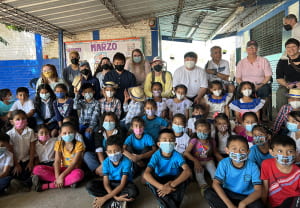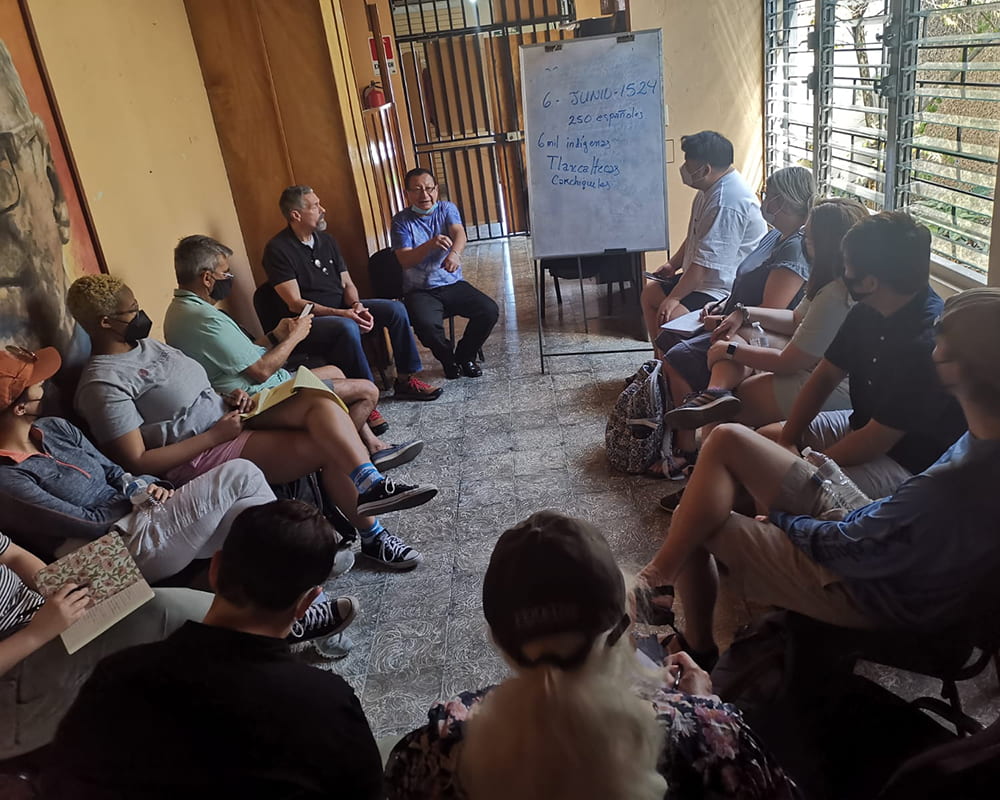Hal Recinos, Professor of Church and Society, often tells his students: “If we want to live our lives awake in the Gospel, stay close to human suffering.”
 By the end of this year’s Spring Break, a dozen Perkins students understood that clearly, after traveling with Recinos and host Edwin Pineda for a week in El Salvador. The group visited San Salvador and the Department (region) of Morazán, meeting with leaders of human rights and advocacy groups seeking justice for individuals and communities caught up in violence and abuse. Recinos has been leading this trip every other year for more than 30 years.
By the end of this year’s Spring Break, a dozen Perkins students understood that clearly, after traveling with Recinos and host Edwin Pineda for a week in El Salvador. The group visited San Salvador and the Department (region) of Morazán, meeting with leaders of human rights and advocacy groups seeking justice for individuals and communities caught up in violence and abuse. Recinos has been leading this trip every other year for more than 30 years.
Stephanie Bohan, an M.A.M. student, said she was unprepared for what she saw; she spent time between visits processing what she’d witnessed.
“Seeing what poverty looks like for most of the world, globally as opposed to the U.S., and seeing the military armed guards in front of every nice building and at every public street – that was shocking,” she said.
“The prevailing economic conditions in El Salvador are dismal,” said Recinos. “The agrarian culture is shrinking, as are remittances, which represent about 17% of El Salvador’s GDP. On the other hand, there is openness, at least at the moment. People can talk about these issues publicly.”
One of the most moving stops on the trip was a visit to ORMUSA (Organización de Mujeres Salvadoreñas por la Paz), an organization working to address violence against women in El Salvador.
“Fourteen women a day are killed by their partners in El Salvador, for no reason other than they are women, and the machismo ideology says that women must be obedient to men,” Recinos said. “For many years, the police and judiciary tolerated such violence. It is still common today to find public servants who directly or indirectly prevent women from obtaining justice.”
ORMUSA helped draft a law in 2012 that made femicide — the deliberate murder of women — a criminal category in El Salvador and established special provisions to protect women from gender-based violence. Despite these legal protections, 75% of femicide cases are never prosecuted.
Students also had the chance to speak with local leaders in El Mozote, the village where the Salvadoran Army killed more than 1,200 civilians — men, women and children — in 1981. Recinos helped raise funds for a monument there.
“As the women shared the story of what happened, I was struck by the strength of the Salvadoran people and their commitment to bravery in the face of struggle,” said Julia Castleman, an M. Div. student on the trip. “That was a recurring theme throughout the trip: there’s no reconciliation or healing without truth and justice. The government wants to deny the atrocities that happened, but there can be no peace without truth.”
The group also visited Christian Base Communities of El Salvador, where they met Father Rogelio Ponseele, a Belgian priest who arrived in El Salvador in 1970. Ponseele, 83, was an integral figure in the formation of the Communities, which faced increasing repression during the civil war due to their work organizing Salvadoran communities. When it became impossible to safely continue pastoral work in San Salvador, Ponseele moved to the zones controlled by FMLN forces in Morazán. This area was constantly attacked by the Salvadoran military. Today, the non-profit organization works with poor marginalized communities in human development, education, and sustainability projects.
Students also heard from women advocating for human rights in the community.
“The woman who spoke had the quiet confidence of a person so immersed in her faith that she knew she would prevail over the powers of evil that haunted her village,” said Dianne Carlson, an M. Div. student on the trip.
The group met with leaders of Pro-Búsqueda, a nonprofit association of Salvadoran families of children who disappeared during the civil war in El Salvador in the 1980s. Thousands of children were kidnapped by the military and sold to adoption agencies.
“The government has refused to investigate where these disappeared children ended up,” Recinos said.
 Pro-Búsqueda has located 473 of these children to date. One was a young boy who was kidnapped from his grandmother’s arms and eventually adopted by a family in Australia. The adoptive family was unaware that he’d been kidnapped. That boy, now a man in his 40s, found his biological family through DNA testing, with Pro-Búsqueda’s help. He and his adoptive family flew to El Salvador to meet his biological family.
Pro-Búsqueda has located 473 of these children to date. One was a young boy who was kidnapped from his grandmother’s arms and eventually adopted by a family in Australia. The adoptive family was unaware that he’d been kidnapped. That boy, now a man in his 40s, found his biological family through DNA testing, with Pro-Búsqueda’s help. He and his adoptive family flew to El Salvador to meet his biological family.
“The entire village came out for this tremendous occasion,” Recinos said. “The grandmother was there and told him, ‘You don’t know how long I’ve waited to hug you.’”
Other stops included a visit to the tomb of Óscar Romero, the prelate of the Catholic Church in El Salvador who was murdered in 1980, and Divine Providence Hospital, where the group met with the Mother Superior of the Carmelite Order working at the hospital. The group also attended services at Iglesia Luterana la Resurreccion and met Medardo Gomez, Lutheran Bishop of El Salvador and human rights activist.
Reflecting after the trip, students said their experiences will inform their work in ministry in the future.
“Witnessing the power of the church in these contexts was impactful,” Castleman said. “Not only was the church a source of healing in El Salvador; the church has also been part of the oppression throughout the history of El Salvador. I realized that, as a pastor, I will need to be careful. I can really help or hurt.”
Bohan, who just started a new job as CEO of Hope Cottage, an adoption services organization, will especially remember the visit to Pro-Búsqueda.
“I think this experience is going to add another layer of empathy for me,” she said. “Seeing how honorably they treated the adoptive parents, the birth parents and the children — I can carry that with me at Hope Cottage.
“I am a lawyer and a peacemaker,” said Carlson. “I will draw from the strength of those who live on the margins, that they are given a voice, in all that I do.”
Poem
Hal Recinos wrote this poem while on the trip, after the visit to El Mozote.
The Dark ©
I have many memories fired
in the dark in familiar seasons
of struggle that on mountains
erupt like images that come to
one at the end of a life. they
are stories given to me by the
poor fiercely describing fresh
new ways to hope and live in
a loathing world. I have known
too many campesinos here who
weep until death departs them.
they waited for new days to come,
for love to be carried into the
world with Angel’s wings, for
reasons that point to change
no one would find unworthy
and to drift a little closer to love
and justice. I have learned to carry
the future for them, to find it in Bibles,
reciting prayers in Spanish, delighting
in the life of school children gloated
with dreams and hearing the voices
of those gone yet whispering in the
dark to me. I confess the people of
corn who walk in the dark are right,
one day lightening will slice the top
of government and God will begin
a new heaven on earth!
H. J. Recinos
